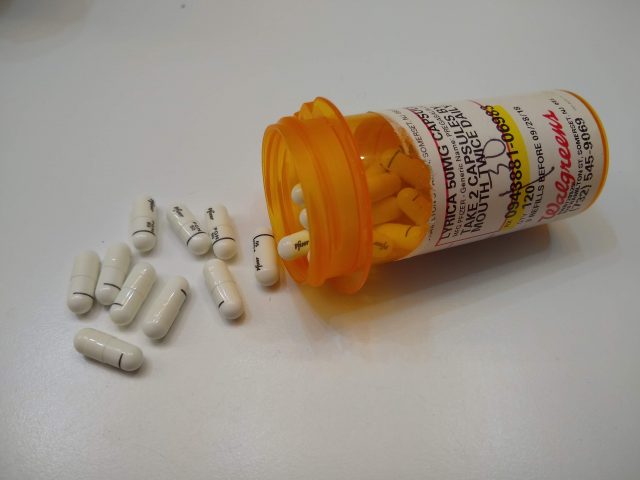Lyrica was the first serious prescription med I took to help manage my sciatica. This was back in July of 2017, not long after my problems began. My initial scans weren’t particularly enlightening, and I begged my doctor for something, anything that could help me manage. The something I got was Lyrica.
I started out at the fairly low dose of 50 mg. It kind of helped. A little bit. In that, it felt like it would sometimes take the sharp edges off some of the nerve impulses, but it never worked well enough for me to see it as anything other than a short-term crutch while I waited for some revelatory test result.
Several times after that, I called my doctor and begged him for help. I couldn’t deal with this, I said. I was going crazy. Wasn’t there anything else he could do? I was open to trying anything. These calls and visits usually ended with him upping my dose.
By September, I was at my maximum dose of 200 mg daily. By that point, it was clear to me that Lyrica’s side effects only added to my problems, while the drug did little to address my problems.
Sure, Lyrica made me drowsy. But I was so sleep deprived that the effect was barely noticeable. If anything, I saw it as an advantage. An extra sleep aid. There was a bit of brain fog happening, times when easy words just wouldn’t come and I’d stare at an email unable to read it, but again, I wasn’t sure if that was a result of the medication or the sleep deprivation.
I gained weight, which was partly due to my retreat from the gym and tendency to self-medicate with food. But I also noticed that Lyrica seemed to affect my appetite. It seemed to slow my nerve impulses so that I wouldn’t feel full until at least an hour after I ate. I learned I needed to measure out my portions in advance to avoid overeating.
But the most disturbing consequence was the dark moods. I remember one night after I upped my Lyrica dose. I was out walking and my thoughts took a dark turn. I made a suicide plan.
I may have my health problems, but anxiety and depression aren’t among them. I have zero history of mental health problems and if anything, I consider myself unusually stable. So even I was surprised by just how lurid and specific my thoughts that night were.
Fortunately, by the time I got back home, logic had snapped into place. I did just double my Lyrica dose, I thought. I decided to allow my morbid imagination one night of free reign, but to avoid acting on anything until I had cut out the meds and reassessed my priorities.
Apparently I’m not a special snowflake, and my experiences aren’t unique. This article from Australia makes me realize that if anything, I got off easy. At least I never became addicted, and Lyrica itself never sent me to the hospital.
If it existed, I would love to read a marketing case study on Lyrica, because I suspect Pfizer pulled some genius moves to encourage doctors to write prescriptions like they’re practicing cursive.
At the time my doctor prescribed Lyrica, I was grateful because he actually made time for me in his schedule when other specialists wouldn’t. He actually spent time with me during my appointments, and answered all of my questions.
It was only later, after another doctor started prescribing me different meds which were somewhat more helpful, that I wondered why this doctor was so stuck on Lyrica. In general this doctor was good at presenting me with options and walking me through the pros and cons. But even when it was clear the Lyrica wasn’t working he never recommended I stop or switch meds. Time and time again, the recommendation was to increase my dose.
What data did Pfizer present him with that made him think Lyrica would be the best choice? I’m speculating here, but I suspect part of the reason for the easy sell is that many of the other meds pain specialists have at their disposal (such as opiates and benzodiazepines) are so fraught. When all your options are bad, it must be easier for a new option to seem more promising than it is.

I’m sorry to hear your experience. I had some similarities with extreme brain fog & tiredness. My doctor put me up to 600mg a day for nerve pain down my leg like fire. Now I’m on 150mg a day which decreases the nerve pain without causing the brain fog. I’ve had depression & suicidal thoughts before chronic pain & now definitely during chronic pain on & off so I wouldn’t know if Lyrica increased that. I would like to get completely off it one day but reducing that last tablet is the hardest. I’ve recently got off opioids after 6 years on them so I’m proud of that. That was hard.
Wow, it sounds like you’ve been on quite the pharmaceutical joy ride! I’m impressed you got off of opioids. I’m sure that was killer.
If I had such a bad reaction to 200 mg of Lyrica, I can’t imagine what 600 mg would feel like! Tapering down to 150 must have been its own ordeal.
I hope you find a good way to manage your pain, whether that includes meds or not!
Doctors definitely DO NOT warn patients about the negative side affects of Lyrica.